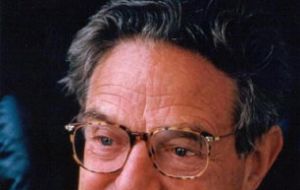MercoPress. South Atlantic News Agency
Scathing attack on banking practice from Soros and Volcker
 George Soros
George Soros Investor George Soros and President Barack Obama advisor, Paul Volcker described the current global meltdown as more severe than when the great Depression with the financial system effectively disintegrated and with the experts “not quite knowing what's going on”.
Soros said the turbulence is actually more severe than during the Great Depression, comparing the current situation to the demise of the Soviet Union. He said the bankruptcy of Lehman Brothers in September marked a turning point in the functioning of the market system. "We witnessed the collapse of the financial system" Soros said at a Columbia University dinner. "It was placed on life support, and it's still on life support. There's no sign that we are anywhere near a bottom". His comments echoed those made earlier at the same conference by Paul Volcker, the former Federal Reserve chairman who broke the back of inflation in the early eighties. Volcker said industrial production around the world was declining even more rapidly than in the United States, which is itself under severe strain. "I don't remember any time, maybe even in the Great Depression, when things went down quite so fast, quite so uniformly around the world" Volcker said, adding that "even the experts don't quite know what's going on." Speaking to a number of those experts Friday, Paul Volcker cited not only the lack of understanding of the global financial meltdown but the "shocking" speed with which it had spread across the world. "One year ago, we would have said things were tough in the United States, but the rest of the world was holding up" Volcker told the conference which included Nobel laureates, economists and investors. "The rest of the world has not held up." Volcker pointed to the fact that industrial production is falling in countries across the globe faster than in the US, one result of the decline caused by the breakdown of unbridled financial markets that operated on a global scale. While he assured his audience of his confidence that capitalism will survive, Volcker said stronger regulations are needed to protect the world economy from such future shocks. And he said he is concerned about the amount of power central banks, treasuries and regulatory agencies have acquired while trying to contain the meltdown. "It is evident in the United States, and not just in the United States, the central bank is taking on a role that is way beyond what a central bank should be taking," he said. Volcker stressed the importance of international cooperation in creating a new regulatory framework, particularly for major banks that operate across national boundaries — the reverse of what's happened in recent years. "The more international agreement we have on where we want to get to, the better off we'll be," Volcker said. This includes a movement toward uniform accounting systems. And while major banks should be more tightly controlled and less able to make the sort of risky bets that led to their current debacle, Volcker said there should also be more oversight of some kind for hedge funds, equity funds and the remaining investment banks. Volcker mocked the argument that "financial innovation," a code word for risky securities, brought any great benefits to society. For most people, he said, the advent of the banking teller machine was more crucial than any asset-backed bond. The current crisis had its beginning in global imbalances like a lack of savings in the United States, but policy-makers around the world were too reticent to take action until it was too late, Volcker said. Finally he underlined that all financial institutions that are deemed "too large to fail" should be subject to increased scrutiny, echoing the findings of the Group of 30, a panel of policy-makers and influential economists, which he leads.




Top Comments
Disclaimer & comment rulesCommenting for this story is now closed.
If you have a Facebook account, become a fan and comment on our Facebook Page!